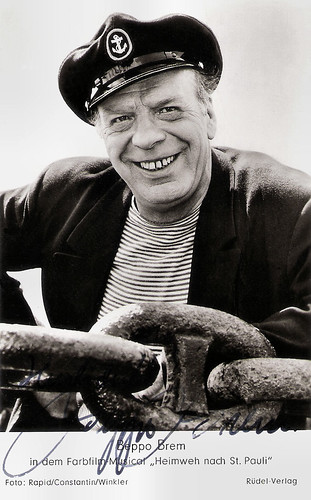
West-German postcard by Kunst und Bild, Berlin, no. A 1198, reprint in a limited anniversary edition, no. KN 64. Beppo Brem in Das Kreuz am Jägersteig/The cross on the Jägersteig (Hermann Kugelstadt, 1954).

East-German postcard by VEB Volkskunstverlag Reichenbach i. V., no. G 705, 1956. Beppo Brem in Wildwest in Oberbayern/Wild West in Upper Bavaria (Ferdinand Dörfler, 1951).
Max Ophüls
Beppo Brem was born Josef Beppo Brem in Munich, Germany in 1909. He was the son of Josef Brem and his wife Maria. His father was a stonemason and beer brewer and Beppo grew up in the Schwabing district of Munich.
Brem studied to become a cabinet maker and his first job was for the Munich Kammerspiele as a stage carpenter. There he discovered his love for the theatre and got a job on stage as an extra.
From 1925 he took acting lessons and in 1927, he got his first contract with the Bauernbühne (Framer's stage) in Bad Reichenhall, Bavaria. From then on, he acted in theatres in Ulm, Regensburg, Berlin, and Munich, and appeared in such plays as Friedrich Schiller's 'Don Karlos' and Carl Zuckmayer's 'Schinderhannes'.
His first film was Die verkaufte Braut/The Bartered Bride (Max Ophüls, 1932) in which he already impersonated a small part of the rough-and-tumble peasant. In the following years, he would play this role over and over again and for which he was extremely well suited because of his coarse appearance and his gentle nature. His next film was Muß man sich gleich scheiden lassen/Do you have to get a divorce right away? (Hans Behrendt, 1933).
Other well-known films, in which he appeared until 1944, were the comedies Das sündige Dorf/The sinful village (Joe Stöckel, 1940), Quax, der Bruchpilot/Quax, the break pilot (Kurt Hoffmann, 1941), Kohlhiesels Töchter/Kohlhiesel's daughters (Kurt Hoffmann, 1943) and Die falsche Braut/The False Bride (Joe Stöckel, 1944). He also worked in the Nazi propaganda films Stoßtrupp 1917/Shock Troop (Ludwig Schmid-Wildy, Hans Zöberlein, 1934), Unternehmen Michael/The Private's Job (Karl Ritter, 1937), Stukas (Karl Ritter, 1941) and Venus vor Gericht (Hans H. Zerlett, 1941). He was named on Joseph Goebbels' "Gottbegnadeten" list as an important German actor.

West-German postcard by Rüdel-Verlag, Hamburg-Bergedorf, no. 1767.Photo: Dörfler-Film / Deutsche London (DLF) / Czerwonski - Marszalek. Beppo Brem in Die fröhliche Wallfahrt/The happy pilgrimage (Ferdinand Dörfler, 1956).

West-German postcard. Photo: Regina / Atlantic. Beppo Brem in Gangsterjagd in Lederhosen/Gangster hunt in lederhosen (Hubert von Blücher, 1959).
Helmut Käutner
During the 1950s, Beppo Brem became very popular with his Heimat films and comedies together with his friend, actor, and director Joe Stöckel. Because of the death of Stöckel in 1959, the promising future of this duo came to an end. He also played with stars such as Heinz Rühmann, Hans Moser, Johannes Heesters, Hans Albers, Heinz Erhardt, Peter Alexander and Theo Lingen.
With his parts in Kurt Hoffmann's Fanfaren der Liebe (1951) and in Helmut Käutner's Des Teufels General (1955) with Curd Jürgens, he got the chance to play a few serious characters, which were an exception. Altogether Beppo Brem appeared in over 200 films and did some guest appearances on TV, especially in the plays by Ludwig Thoma. In 1956, he appeared with Liesl Karlstadt in the first commercial on German television, produced by Henkel for their washing powder Persil. During 1956, several commercials for this product were produced with sketch-like plots, all starring the Bavarian acting duo.
In the 1960s Brem appeared in mediocre film comedies such as Lausbubengeschichten (Helmut Käutner, 1964), the first of five film adaptations of the stories of the same name by the Bavarian native writer Ludwig Thoma. As the popularity of the Heimat and Schlagerfilms diminished, the actor also participated in some German sex films of the 1970s, which did not detract from his popularity. In the theatre, he could escape the cliché and he played broken characters and insignificant figures.
From 1965 to 1970, he played the title role of Inspector Wanninger in about 117 episodes of the TV crime series Die seltsamen Methoden des Franz Josef Wanninger. Wanninger, a Bavarian version of Maigret, was a cunning police inspector, who solved his case unconventionally. The series continued from 1978 to 1982 with the title Die unsterblichen Methoden des Franz Josef Wanninger. There were a total of 117 episodes. A highlight of his late work was his portrayal of the caretaker in the comedy Hexenschuß (1987) with Helmut Fischer.
Beppo Brem made his last appearances in the play 'Der verkaufte Großvater', in the TV series Heidi und Erni and as a retired tram driver in the melancholy drama Auf dem Abstellgleis (1989) with Erni Singerl and Toni Berger. Shortly after finishing this film, Beppo Brem passed away in 1990 in a hospital in Munich from lung cancer. He was 84. Brem was married to Marga Wening from 1932 till he passed away. From this marriage, a daughter was born. In 1983 Brem was honoured with the Bundesverdienstkreuz (Order of Merit of the Federal Republic of Germany).

West-German postcard by Rüdel-Verlag, Photo: Rapid / Constantin / Winkler. Beppo Brem in Heimweh nach St. Pauli/Homesick for St. Paul (Werner Jacobs, 1963).

West-German autograph card.
Sources: Wikipedia (Dutch and German) and IMDb.
This post was last updated on 8 August 2023.
No comments:
Post a Comment